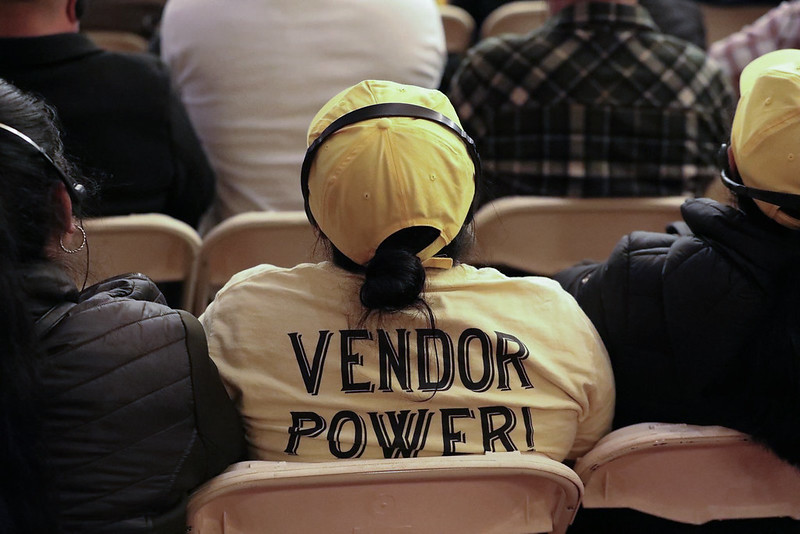For decades, the number of street vendors has far exceeded the number of permits that allow them to legally set up shop on New York City streets. A City Council bill wants to change that.
Street vendors and advocates attending the City Council’s hearing on permitting reforms Wednesday. (Alex Krales/NYC Council Media Unit)
For decades, the number of street vendors has far exceeded the number of permits that allow them to legally set up shop on New York City streets.
In 2021, the City Council passed Local Law 18, which aimed to increase the number of food vendor permits by 445 per year starting in 2022. However, only 382 new permits have been given to vendors so far, said Corinne Schiff, deputy commissioner for environmental health at the Department of Health and Mental Hygiene (DOHMH), during a Council hearing Tuesday.
The New York City Council heard testimony about a package of bills to reform the process, including one that would increase the number of permits by 1,500 each year for five consecutive years—and then lift the cap altogether. Another bill would decriminalize vending offenses (Int. 47), and a third would create a division of street vendors assistance within the Department of Small Business Services (Int. 0408).
Right off the bat, officials from Department of Consumer and Worker Protection (DCWP), Department of Sanitation (DSNY), DOHMH, and Department of Small Business Services (SBS), weighed in on the possibility of increasing the number of permits, which they saw as viable. But agency officials did not support lifting the cap on the number of licenses altogether—the second part of the bill that Bronx Councilmember Pierina Sanchez introduced.
“The New York City Health Department has no concerns about issuing more supervisory license applications annually than local law currently requires, and would like to work with the City Council on some of the details to ease implementation,” said Corinne Schiff, DOHMH deputy commissioner for the environmental health division.
However, she added, “the administration is opposed to lifting the cap entirely.”
One of the first steps a person must take to prepare or serve food for vending is to obtain a vending license with the DOHMH. The second step is to obtain a permit, the number of which has been capped for decades, leading many vendors to seek them on the black market, often paying exorbitant prices.
During the hearing, Schiff argued that eliminating the cap would increase the department’s workload on mandatory food safety training, inspections, issuance of licenses and permits, while requiring more funding.
Carlos Ortiz, DCWP’s deputy commissioner for external affairs, offered another argument as to why the cap should not be lifted: “Impact on quality of life.”
During Tuesday’s hearing, representatives from the city’s Business Improvement Districts or BIDs—which represent brick-and-mortar businesses, and often view street vendors as competition—testified against the bill, and doubled down on the need for more enforcement.
“The issue of how many licenses you wanna give is irrelevant to the Garment District,” said Barbara Blair, president of the Garment District Alliance, a BID in Midtown Manhattan. “What is relevant is regulating time, place, and manner that are enforceable, rules that are enforceable, and are in fact vigorously enforced.”
The city already regulates where and when street vendors can operate, like only on sidewalks that are at least 12 feet wide, and some permits only work seasonally, among other rules.
Enforcement responsibilities primarily fall to the DSNY, which took the lead on enforcement of the city’s vendors in 2023. But since 2022, the New York City Police Department (NYPD) has led in issuing the greatest number of tickets to vendors. In 2024 alone, these agencies issued over 13,000 tickets to city vendors, and seized tons of food.
Julie Menin, chair of the Council’s Committee on Consumer and Worker Protection, pressed DOHMH officials about why most of those who’ve obtained supervisory licenses since Local Law 18 was passed did not yet have supervisory permits.
“We don’t know the answer to that,” Schiff said. “The local law doesn’t have a deadline to apply for the permit, and so they may eventually turn into permits.”
Mahmoud Zayed, a street vendor since 2008, said he has rented a permit through the black market for years, “as I have never been able to obtain one in my own name.”
“I have been forced to pay thousands of dollars every two years to people who were able to get permits directly from the city while they only pay a small fee,” he added.
During the more than six-hour hearing, more than 80 people testified, including dozens of street vendors, but also brick-and-mortar owners, investors, content creators, and the general public. The vast majority of speakers supported the bill.
Proponents say street vending, a largely immigrant-powered sector, is often one of few options for people trying to earn a living in an increasingly expensive city. Protections are even more important now, as immigrants are being targeted for arrest and deportation under the Trump administration.
After the hearing, Carina Kaufman-Gutierrez, deputy director of the Street Vendor Project, said it was encouraging to see the administration calling for expanding the total number of vending permits.
“The fight for reforming the street vending system in New York has always been urgent, but especially under this current federal administration, it’s essential,” Kaufman-Gutierrez said.
To reach the reporter behind this story, contact Daniel@citylimits.org. To reach the editor, contact Jeanmarie@citylimits.org
Want to republish this story? Find City Limits’ reprint policy here.
The post NYC Officials Back More Street Vendor Permits, But Resist Lifting Longtime Cap appeared first on City Limits.

